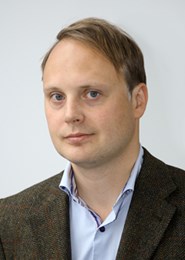
I am a professor of organic chemistry.
Concept
Our research group focuses on molecular approaches to dissect infection mechanisms of intracellular pathogens. The research can be divided into two tracks, one dealing with posttranslational modifications as a host-pathogen crosstalk, and a second, more applied program, where we use our knowledge to combat apicomplexan parasites by interfering with their metabolisms. Our main competence is synthetic organic chemistry in a biological context.
Jag är affilierad PI till Umeå Centre for Microbial Research, UCMR.
Read more about the group's research
Background
Intracellular pathogenic bacteria have evolved a number of strategies to enhance both their survival and virulence during infection of a host. One such tactic is to chemically modify their eukaryotic hosts using toxin proteins that are injected via dedicated translocation machineries, like secretion systems. Once inside the host/prey cell, toxins display catalytic activity against central components of the host cell, targeting functions like cytoskeleton dynamics, vesicular trafficking and modulating the different nodes and levels of cell signaling. Most toxins employ a reactive metabolite from the host as a co-substrate. This is often a nucleotide, which is in part covalently transferred to the target proteins, thus inhibiting protein-protein interactions of the modified protein with other effectors. For example, phosphorylating toxins transfer the γ-phosphate from host cell ATP, with ADP as a leaving group, analogous to a eukaryotic kinase. On the other hand, an adenylylating (a.k.a AMPylating) toxin utilizes ATP in a different fashion. Here, the AMP moiety is attached to an amino acid residue of a host protein. In effect, the nucleobase monophosphate is transferred and pyrophosphate functions as a leaving group. This illustrates the ingenious nature of pathogens to make use of the available nucleotides.
Biography
Christian Hedberg was born (1975) and raised in Boden, north of Sweden. He attended technical high school in Boden with specialization in chemistry, where he decided to become an organic chemist. Next, chemistry studies at Uppsala University followed. He defended his PhD-thesis in 2005 in the field of homogeneous catalysis, pioneering the mechanism-driven design and development of P,N ligands for enantioselective Ir-catalyzed hydrogenation under the guidance of Prof. Pher Andersson. In 2005, Hedberg received an Alexander von Humboldt postdoctoral fellowship and moved to Max-Planck Institute of Molecular Physiology, joining the research group of Prof. Herbert Waldmann at the department of chemical biology. Hedberg became junior Max-Planck group leader in 2008 and started his independent academic career. In 2013, Hedberg was received a Wallenberg Academy fellow award, and moved to Umeå University, institute of chemistry, as senior lecturer in 2014. In 2020, Hedberg was promoted to full professor of organic chemistry at Umeå University.